- Home
- Nick Hornby
Books, Movies, Rhythm, Blues: Twenty Years of Writing About Film, Music and Books
Books, Movies, Rhythm, Blues: Twenty Years of Writing About Film, Music and Books Read online
Books, Movies, Rhythm, Blues
Twenty Years of Writing About Film, Music and Books
Nick Hornby
RIVERHEAD BOOKS
A member of Penguin Group (USA)
2013
RIVERHEAD BOOKS
PUBLISHED BY THE PENGUIN GROUP
PENGUIN GROUP (USA) LLC
375 HUDSON STREET
NEW YORK, NEW YORK 10014
USA • Canada • UK • Ireland • Australia • New Zealand • India • South Africa • China
penguin.com
A Penguin Random House Company
Copyright © 2013 by Nick Hornby
Penguin supports copyright. Copyright fuels creativity, encourages diverse voices, promotes free speech, and creates a vibrant culture. Thank you for buying an authorized edition of this book and for complying with copyright laws by not reproducing, scanning, or distributing any part of it in any form without permission. You are supporting writers and allowing Penguin to continue to publish books for every reader.
Penguin is committed to publishing works of quality and integrity. In that spirit, we are proud to offer this book to our readers; however, the story, the experiences, and the words are the author’s alone.
Contents
Introduction
My Patron
Abbey Road
Pain in My Heart
‘You Send Me’
A Fan’s Notes
Revolution in the Head
Internet Music
The Crying Game
Marah
A Stranger in a Strange Land
The West Wing
An Education
A Sundance Diary (2009)
Kidding Around
The Goons
Wodehouse
Scenes from Provincial Life
Ideas for Books
Life Goes On: Richard Billingham
Humphrey Ocean
London
Sources
ABOUT THE AUTHOR
Nick Hornby is the author of six internationally bestselling novels (High Fidelity, About a Boy, How to be Good, A Long Way Down, Slam and Juliet, Naked) and a number of works of acclaimed non-fiction: Fever Pitch, 31 Songs, The Complete Polysyllabic Spree and Stuff I’ve Been Reading, as well as two other Penguin Special ebooks: Pray and Fan Mail. He lives in Highbury, north London.
Introduction
For the first five years or so of my writing career, I reviewed books, hundreds of them. Mostly, the books weren’t great, because writers in the first five years of their career aren’t often given great books to review, and many of them are now out of print. You really wouldn’t want to read these reviews now. A couple of non-fiction reviews are included in this collection because you might be interested in the subject matter – the Beatles, Jerry Wexler, children’s games – but most of the writing I did back then could only really be of interest to somebody writing a thesis on British and American first and second novels of the 1990s. Later, when my books and films came out, I wrote pieces to support their release, but most of those aren’t worth reprinting here, either. Their main purpose, of course, was to drive people towards bookshops and cinemas, and it would seem a bit of a cheek to present them to you now as journalism that has survived the test of time. It is, in fact, dispiriting to realize, when trawling through cuttings, just how many words and how much of one’s time has been spent trying to flog something, or to get people to contribute to one of the charities one is involved with. I’m hoping this is true for a lot of writers, hence the impersonal pronoun, and not just a complaint by someone who has been too easily manipulated by publicists.
Anyway, this collection represents the best of what’s left, pieces written for fun, or because I felt I had things to say and time to say them in, or because the commissions were unusual and imaginative, or because (in the case of the piece written about the Oscars for Empire magazine) I was being asked to go somewhere I’d never been. One or two of the pieces I’m proudest of have never been published before, or at least published in places you might not know about. The piece about the Goons was written for Steve van Zandt’s terrific-sounding forty-chapter history of rock ’n’ roll, which he wanted to use as a basis for a high-school curriculum; at the time of writing, I don’t know what’s happened to it, or whether the Goons will make the cut. I was asked to write about Abbey Road for a brochure published by the studio to commemorate some anniversary or another. The piece about London was written relatively recently, for the beautiful and smart Boat magazine. Other pieces were for magazines that people don’t see in the UK (Believer, for example), or for books that weren’t published here. I only wish there were more of them.
NH, London, June 2013
My Patron
In 1988, I was thirty-one years old. I was a writer in all the senses that count, apart from one: I hadn’t sold a thing, and there seemed to be no real prospect of me selling anything, either. I was working as a teacher in a language school in Soho, London; it was, I feared, exactly the sort of job you drifted into at that age, when you had no real chance of doing the work you really wanted to do. I was afraid of the future – of telling younger colleagues in the year 1999 or 2009, aged forty-two or fifty-two, that I was a writer, but a writer whose stuff never got made or published. In the kinds of jobs I had been doing, I met people like that all the time: writers, actors, the occasional ancient musician. They scared me. Meanwhile, the friends I had made at university were all on a career ladder. They were academics or diplomats or journalists or accountants, and they were starting to make money. When I arranged to meet them, I was embarrassed by my own lack of advancement – embarrassed, too, that evenings out couldn’t involve food, because restaurants were too expensive.
If someone had told me that I was a couple of years away from being given a book contract that would change my life, then of course I’d have been happy enough to sit and wait it out. (And I’d have been amazed, too. I’d hardly written a paragraph of prose – all my efforts hitherto had gone into scripts, terrible things intended for the movies but which could just as easily have been performed on the radio, consisting as they did of a handful of conversations between two people.) But I didn’t know that. My suspicion was that I was kidding myself, and that the smart thing to do would be to give up the writing and find myself a proper teaching job, if only so that I could pay for my own pizza sometimes.
The principal of the language school was a few years older than me, a smart, dry, interesting man who, years later, for reasons too involved to explain here, became my psychoanalyst, a job he has held down to this day. He was still training for the shrinkhood back then, although it seemed entirely indicative of our respective prospects that his make-do, pay-the-way job was as a principal of a school, and mine was part-time, non-contract teacher. One day he offered me a little bit of extra work at the offices of a large Asian trading company that had just set up in London. ‘They’ll pay well,’ he told me, and he was right: they offered me forty pounds for two hours’ teaching a week, an amount that probably amounted to about a quarter of my weekly wage.
I nearly didn’t take the job. They wanted me to work on Saturday mornings, and I couldn’t think of anything worse. (That is almost certainly true, I now realize. I’ve learned very little over the last couple of decades, but I do now know, regrettably, that there are worse things than setting an alarm clock on a weekend.) I played five-a-side football on Saturday mornings, I explained. They asked me what time the game took place, and I told them eleven o’clock, and
they laughed – there was no scheduling clash as far as they were concerned. They wanted me in at eight, before their day’s work started. (This was the first thing I learned about them: they worked extraordinarily hard, these young Korean sales executives, much harder than anyone in England. Their contracted hours were 8 a.m. until 8 p.m., Monday to Friday, and 8 a.m. to 2 p.m. on Saturday. When the recession kicked in, a couple of years later, they were told to combat it by working Sundays, too. But those were just the contracted hours. Anyone with any ambition couldn’t be seen knocking off at eight, just as my friends with proper jobs couldn’t leave the office at five.)
I really, really didn’t want to work at eight o’clock on a Saturday morning. Friday nights were always late – my friends and I would often go to a cheap but utterly great nightclub in Kentish Town, the Locomotion, until two or three in the morning. (The music they played at the Locomotion I borrowed wholesale for the club that my narrator Rob ran in my first novel, High Fidelity.) And then there was the five-a-side, and then, every other Saturday, my team Arsenal played at home, and even watching football was tiring in those days: you stood, for two and a half hours, on concrete terraces, buffeted by fellow fans. But forty quid …
So I took it, and walked into their offices in Holborn still blinded by sleep and sometimes reeking of booze. I used to prepare a little bit, but mostly, I was told, they wanted conversation, so I would take in photocopied articles from the Guardian and the Economist, and sometimes we would get around to reading them, studying the vocabulary, talking about the pieces and the week’s news. More often than not, though, the lessons didn’t happen in the way I planned them, and sometimes they didn’t happen at all. Most of them were too busy, at eight o’clock on a Saturday morning, to learn English, and the ones that did turn up needed urgent help with something practical – a letter to a solicitor about a patent or a terminated contract or something else I didn’t really understand. I presumed that they needed my help because the local staff didn’t and wouldn’t work on a Saturday morning, but later on I discovered that there wasn’t really a local staff. The company had so recently arrived it hadn’t yet really got around to employing local staff.
After a few weeks of being asked about planning permission and the local council and the prevailing economic weather, an idea began to form. What if I offered my services on a regular part-time basis? Like, what if I came in every afternoon and helped them with anything that was going on, anything where it was easier to be English than Korean? My nationality was my main talent, as far as they were concerned, and I could see that, in this place, at that time in the company’s history, my main talent had an economic value. I went to see one of the managers, gave an oral version of the job description, and got offered a job on the spot.
They asked me how much money I would want. I’d actually thought about this. My room-mate was a management accountant, and he was paid what seemed to me to be a preposterous amount of money. I told them that I’d work every afternoon for half the salary he earned. They didn’t even blink. And if I had to isolate the single most important moment in my writing career, then that would have to rank in the top two or three. The eternal, morale-sapping question of how to earn money while writing had been answered, without any apparent thought on the part of the party who had the money. And I did write, too: I was disciplined about it. The first story I ever sold was written in the mornings I had available, and the first chapters of my first book, and a lot of book reviews in newspapers … I had a patron, and my patron paid for all that. But between 2 p.m. and 6 p.m., I was an Asian yuppie. On the tube home, I could feel the ulcers developing, and I know that if I’d been asked to work in the mornings, leaving the afternoons free for writing, I’d just have put a cold flannel over my face and lain down on the floor of a darkened room. No stories or reviews or early chapters would ever have been written.
On the first afternoon, I sat down at the desk that had been found for me, and started to go through the day’s newspapers. I was told to photocopy anything that might be of professional interest and fax it to Head Office. I was happy. This seemed like the sort of job an English graduate who wanted to write should be doing – something that involved literacy, nothing too stressful, an entirely appropriate job for a would-be man of letters who needed money but didn’t want to break sweat getting hold of it. After a pleasant hour or so reading the sports pages and idly circling an article about inflation, the company secretary called me in to his office.
‘Mr Nick.’ (They never did drop the mister, in the three years I was there.) ‘We need the plans for the gardens of Hampton Court Palace. Urgently.’
I gaped at him.
‘Why?’
This was an inappropriate question, one that I would eventually learn not to ask. Curiosity was permissible, at some point in the job, but my immediate, knee-jerk ‘Why?’ was a snotty ‘why’: it implied, as I meant it to, that I’d only do the job if someone could provide me with a good reason. It was the ‘why’ of a free-spirited arts graduate, not a company man, and if I was going to do this job I had to be a company man.
I was new, so he answered me anyway.
‘The chairman is building a replica in Seoul.’
This was my introduction to the character and interests of the chairman, a man who I would come to hear a lot about over the next couple of years. As far as I could work out, he owned the company, one of the biggest trading companies in the world. When he spoke, he was heard in a thousand different cities. Sometimes I felt sorry for him, because his whims and musings, it seemed to me, became solidified and real and troublesome when perhaps he didn’t mean them to be. Had he really said ‘I want to build a replica of Hampton Court’? Or had he said, ‘Hey, it would be cool if we had a replica of Hampton Court here,’ and then chuckled, the way that you or I might have done. It never would have occurred to him that he would thus be causing trouble and stress for somebody half a world away.
I took a train down to Hampton Court, which is in the south-west suburbs of London. It was Henry VIII’s favourite palace. Its gardens are famous, a tourist attraction; there’s a maze that has been there for hundreds of years. When I got there, I wandered around aimlessly, asked the person in the gift shop if the plans were for sale, bought a guidebook and went back to the office.
‘I couldn’t find them,’ I said cheerfully. Job done. Well, undone, anyway. But, you know, done as far as I was concerned. Done because it couldn’t be done, so it was now someone else’s problem.
‘Tomorrow, please,’ said the company secretary, with an awful finality.
I should mention at this point that there was no internet back then. There were faxes and telephones, although nobody had a mobile phone. Research was laborious, and invariably involved going somewhere. I should also point out that I am a can’t-do person. If a job is hard, then my philosophy is that it’s best to give up on it straight away, especially if it contains the potential for embarrassment. Writing was fine; you just had to write. Selling the work to anyone – an agent or publisher or producer – was impossible, though, because that might at some point involve a phone call that only a big-head or a show-off or someone with some sense of his own self-worth would make. (I may well have taken the afternoon job because it would allow me to write for ever: I could stick my work in a brown envelope, send it to some people who would never read it and then start on something else without ever having to speak to anyone.) I suddenly saw that this job might have the potential for endless, permanent, excruciating embarrassment. It might involve pestering people, for example – soon enough I would find out that it would involve phoning people who’d hung up on you ten minutes previously – and I could always see the reasons why they wouldn’t want to give me something I was asking for. Maybe this sympathy would be useful in my morning job, but it wasn’t much use to me here. When you’re an Asian company man, the ability to see another person’s point of view was a disadvantage.
In the year or so that had elapsed between my st
arting the Saturday morning teaching job and the part-time office job, my weekly football had moved to a Monday night slot. People had started having kids, and their weekend time was more precious. Coming out of the underground station, I bumped into one of my teammates, a guy I didn’t know that well. On the walk to the sports hall, I started telling him about my new job. He was mystified by it, probably because I couldn’t really understand it myself.
‘Like, what sort of thing?’
‘Today they asked me to find the plans for the grounds at Hampton Court. I mean …’
‘Oh, we’ve got them,’ he said.
I looked at him. He was serious.
‘I’m a landscape architect,’ he said. ‘We’ve got all that stuff.’
I called into his office on my way to work the following day, and then marched into my office brandishing the photocopies they needed. I was gleeful and somewhat amazed: I’d actually achieved the hard-looking thing they had asked me to achieve. They were politely grateful, but not amazed in the least. This was what they had paid me to do, and I had done it. It was no big deal.
At the beginning of the following week, they asked me to buy an equestrian centre. There was a note on my desk, waiting for me. PLEASE BUY EQUESTRIAN CENTRE, it said. (Why? Because the company was going to be sponsoring their country’s equestrian team at the next Olympics, and England, it had been decided, was the best place for training.)
When you’re a can’t-do kind of a guy, this isn’t a message you want to read. And, as luck would have it, they’d picked another area of life about which I knew literally nothing. I thought of a couple of counties in the southern half of England where, it seemed to me, equestrianism might be going on, phoned a couple of estate agents, asked if they had any equestrian centres for sale. They didn’t. I went back to reading the sports pages and circling the inflation articles.
Two hours later, my boss called me in.

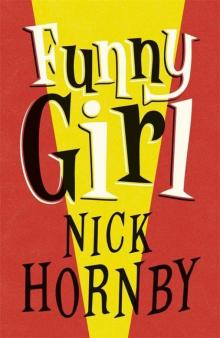 Funny Girl
Funny Girl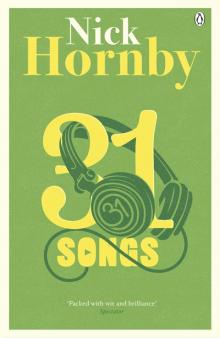 31 Songs
31 Songs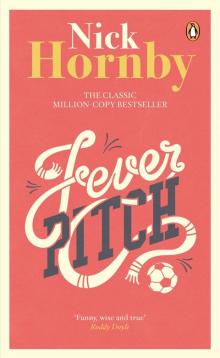 Fever Pitch
Fever Pitch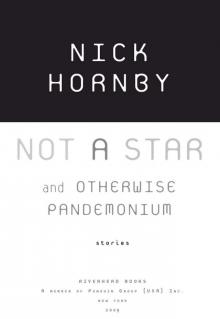 Not a Star and Otherwise Pandemonium
Not a Star and Otherwise Pandemonium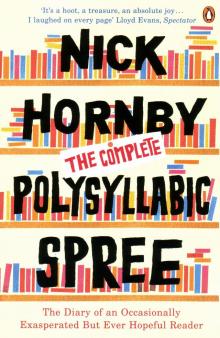 The Complete Polysyllabic Spree
The Complete Polysyllabic Spree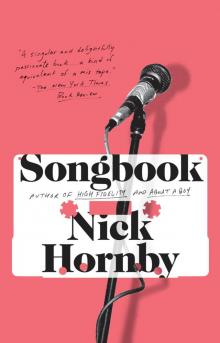 Songbook
Songbook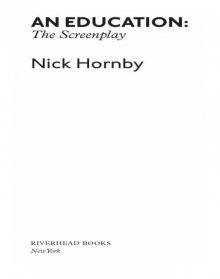 An Education
An Education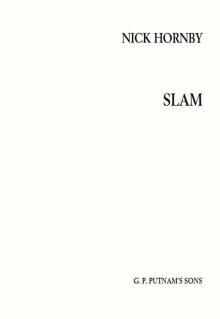 Slam
Slam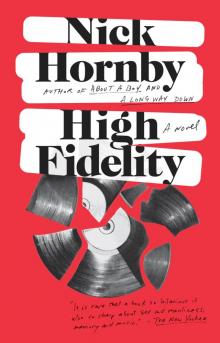 High Fidelity
High Fidelity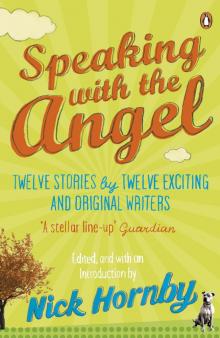 Speaking With the Angel
Speaking With the Angel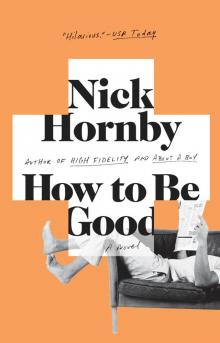 How to Be Good
How to Be Good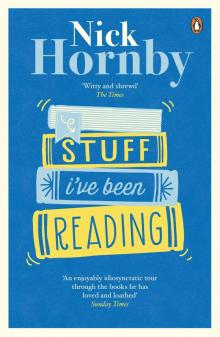 Stuff I've Been Reading
Stuff I've Been Reading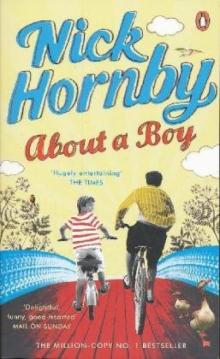 About a Boy
About a Boy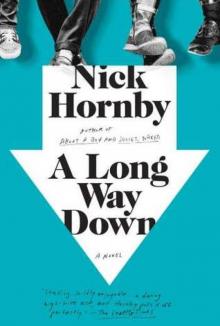 A Long Way Down
A Long Way Down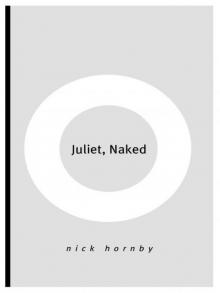 Juliet, Naked
Juliet, Naked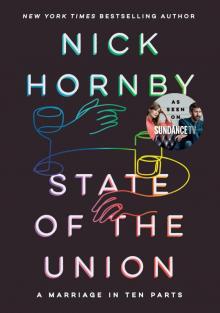 State of the Union
State of the Union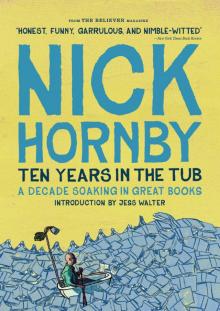 Ten Years in the Tub: A Decade Soaking in Great Books
Ten Years in the Tub: A Decade Soaking in Great Books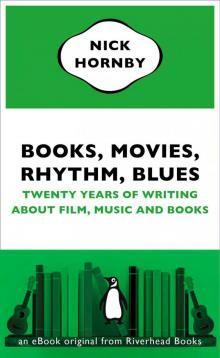 Books, Movies, Rhythm, Blues: Twenty Years of Writing About Film, Music and Books
Books, Movies, Rhythm, Blues: Twenty Years of Writing About Film, Music and Books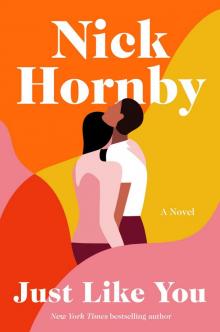 Just Like You
Just Like You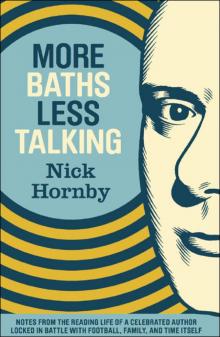 More Baths Less Talking
More Baths Less Talking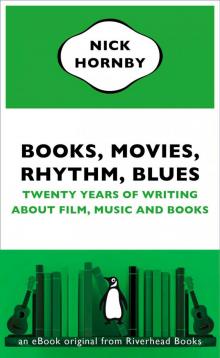 Books, Movies, Rhythm, Blues
Books, Movies, Rhythm, Blues